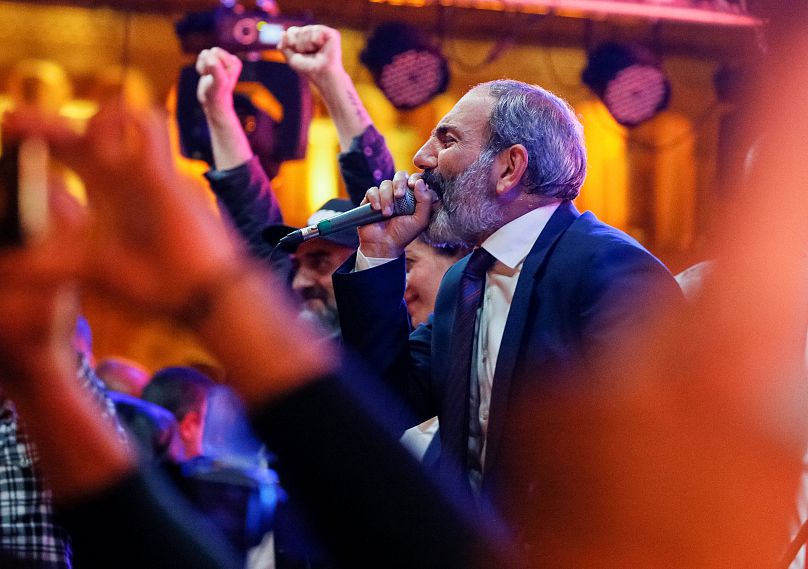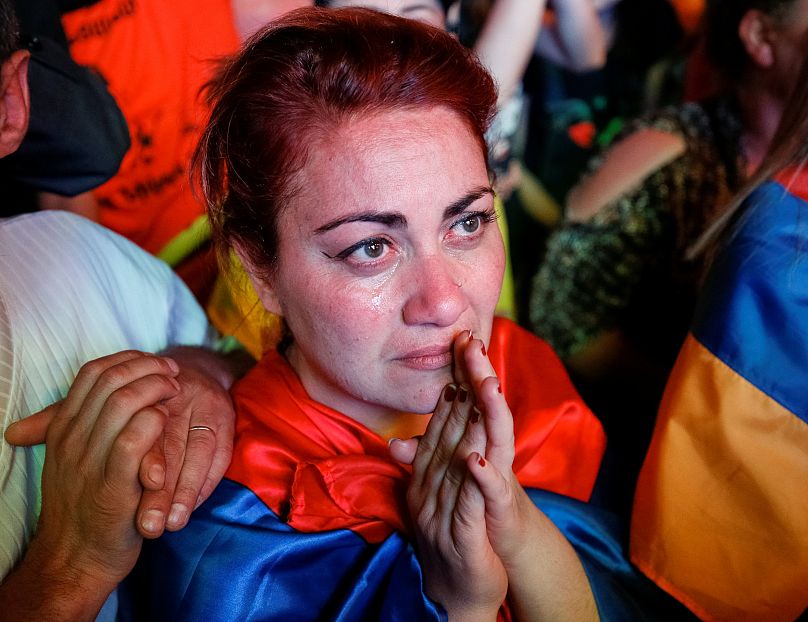Nikol Pashinyan urged protesters to shut down transport systems after the ruling Republican Party's parliamentary majority rejected his candidacy for prime minister.
Wednesday is a big test for Armenia’s anti-government protest movement, after opposition leader Nikol Pashinyan called for a general strike following parliament’s refusal to accept him as prime minister.
As night fell in Yerevan on Tuesday, Pashinyan spoke to tens of thousands of supporters and called on them to block the country’s transport systems.
“We will block the streets, the airports, the metro, the railway, everything that can be blocked,” he said.
Early on Wednesday morning protesters duly blocked some routes into the capital, several junctions in the city centre, and a road to the airport. "We will be staying here," 19-year-old David, one of the protesters near the airport, told Reuters.
The planned protests in the small former Soviet country pave the way for a standoff between demonstrators who poured into the streets throughout much of April, and the ruling party which still has a majority in parliament.
Darkened mood
The mood in the Armenian capital took a dramatic turn on Tuesday.
The celebratory atmosphere that had persisted all day suddenly changed when it emerged the ruling Republican Party would not accept Pashinyan as prime minister.
Tens of thousands of people had spent all day in the square outside Parliament waiting for the parliamentary vote to choose a new premier. This followed the resignation last week of veteran leader Serzh Sargsyan, after two weeks of protests.
Many Armenians were infuriated when, after a decade as president, Sargsyan was surprisingly chosen by parliament to be prime minister – a job he had said he would not seek, and whose powers have been boosted under constitutional reforms he pushed through in 2015.
Before Tuesday's vote, Pashinyan had earlier warned of a possible “tsunami” of anger, saying the country would be plunged into a political crisis if the ruling party failed to support his candidacy.
But the numbers fell short, even though the leader of an opposition faction was the only nominee submitted for the vacant prime minister’s post. The ruling Republican Party still has a parliamentary majority, and after hours of acrimonious debate withheld its support for Pashinyan’s candidacy.
Lawmakers accused the protest leader of being an irresponsible rabble-rouser, lacking the qualities to command Armenia’s armed forces.
'Shame!'
Supporters of Pashinyan, after watching the debate on large screens in the capital’s Republic Square, shouted “shame” when the result came through.
“It showed once again that they don’t care about us, about the ordinary people,” said Gurgen, a 61-year-old unemployed man in the crowd.
The crisis in Armenia, which has Russian bases on its territory, is being closely watched in Moscow. Last week the Kremlin said it did not see any signs of a “destabilising situation” such as that in Ukraine in 2014 when a pro-Russia government was swept out by popular revolt. It responded to Sargsyan's resignation by calling on all sides to act responsibly and for the constitution to be respected.
Nikol Pashinyan, a 42-year-old former journalist who spent two years in jail for stoking unrest, has pledged to keep Armenia close to Moscow, arguing that he wants to focus on rooting out corruption.













